Allegheny College
 | |
| Type | Private liberal arts college |
|---|---|
| Established | 1815 |
| Endowment | $183.1 million (2015)[1] |
| President | James H. Mullen, Jr. |
Academic staff | 157[2] |
| Students | 1,931 (2015)[3] |
| Location | Meadville, Pennsylvania, USA |
| Campus | Small town, 542 acres (219 ha) total |
| Colors | Blue and Gold |
| Athletics | NCAA Division III – NCAC |
| Nickname | Gators |
| Affiliations |
GLCA MSA – MCHE Annapolis Group |
| Website |
www |
 | |
| Designated | November 19, 1946[4] |
Allegheny College is a private, coeducational liberal arts college in northwestern Pennsylvania in the town of Meadville, approximately 35 miles (56 km) south of Erie.[5] Founded in 1815, Allegheny is the oldest college in continuous existence under the same name west of the Allegheny Mountains.[6] Allegheny is a member of the Great Lakes Colleges Association and the North Coast Athletic Conference and it is regionally accredited by the Middle States Commission on Higher Education.
History
Early history
Allegheny was founded in April 1815[7][8] by the Reverend Timothy Alden, a graduate of Harvard's School of Divinity. The college was historically affiliated with the United Methodist Church after 1833, although it is currently non-sectarian.
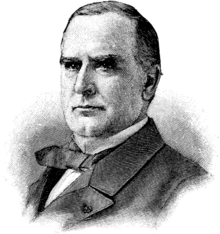
The first class, consisting of four male students, began their studies on July 4, 1816, without any formal academic buildings. Within six years, Alden accumulated sufficient funds to begin building a campus. The first building erected, the library, was designed by Alden himself, and is a notable example of early American architecture. Bentley Hall is named in honor of Dr. William Bentley, who donated his private library to the College, a collection of considerable value and significance. In 1824, Thomas Jefferson wrote to Alden, expressing the hope that his University of Virginia could someday possess the richness of Allegheny's library.[9] Alden served as president of the college until 1831, when financial and enrollment difficulties forced his resignation. Ruter Hall was built in 1853.[10]
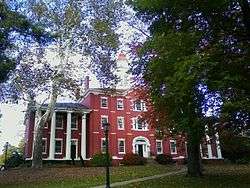
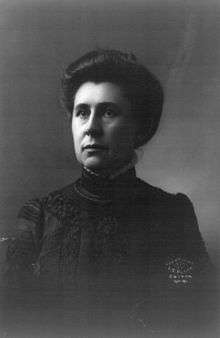
Allegheny began admitting women in 1870,[11] early for a US college; a woman was valedictorian of the Allegheny class of 1875.[11] One source suggests that Ida Tarbell, the pioneering journalist who exposed the predatory practices of Rockefeller's Standard Oil Company, was the first woman to attend Allegheny.[12]
In 1905, Allegheny built Alden Hall as a new and improved preparatory school.[7]
Over the decades, the college has grown in size and significance while still maintaining ties to the community.
Recent history
In 1971 the film Been Down So Long It Looks Like Up to Me based on the Richard Farina novel was filmed on college grounds.[13][14]
While the word "Allegheny" is a brand for the college, it is also the name of a county, a river, and a mountain range, and the school has tried to prevent other entities from using this word. For example, Allegheny objected in 2006 when Penn State tried to rename one of its campuses "Allegheny".[15][16] Allegheny president Richard Cook said 'Allegheny' was "our brand."[15] It sued the Philadelphia's Allegheny Health and Research Foundation in 1997 to change its name.[17]
Under president Richard J. Cook, Allegheny was reported to have had a "stronger endowment, optimal enrollment, record retention rates, innovative new programs and many physical campus improvements."[18] These years were marked by tremendous growth in the endowment, marked by a $115-million fund-raising drive, bringing the endowment to $150 million.[19][20] In February 2008, James H. Mullen Jr. was named the 21st president of Allegheny. He took office Aug. 1, 2008.[21]
The college and the town cooperate in many ways. One study suggested the Allegheny College generates approximately $93 million annually into Meadville and the local economy.[22] Since 2002, Allegheny hosts classical music festivals during the summer.[23] In October 2006, the college attracted negative publicity after local enforcement cited over 100 people for underage drinking at a college party.[24] In July 2007, a 1,500-pound wrecking ball demolishing part of Allegheny's Pelletier Library broke its chain, rumbled down the hill, careened "back and forth across the street," hit nine parked cars, wrecked curbs, and crashed into the trunk of an Allegheny student's car, pushing his car into two cars in front of him.[25][26] Eight soccer balls in his car "likely lessened the impact of the wrecking ball," and possibly spared his life, according to a police officer on the scene.[25][27] The student body voted to name the library's coffee shop "The Wrecking Ball" after the event.
The college has sponsored panels on unusual topics such as face transplants (2009).[28] Allegheny professors have joined highly visible initiatives; for example, Allegheny professor Michael Maniates, described as the "nation's leading authority on the politics of consumption," joined the board of a project about the twenty-minute film The Story of Stuff by filmmaker Annie Leonard, and generated headlines.[29] Dr. Maniates said "We really need to think of ways of making it possible for people to think about working less and getting by on less."[30] At present, environmental concerns are important at Allegheny, which in 2008 worked with Siemens to devise a "total energy use reduction plan" for the college.[31]
Campus
The campus has 40 principal buildings on a 79-acre (32 ha) central campus, a 203-acre (0.82 km2) outdoor recreational complex, and a 283-acre (115 ha) nature reserve and protected forest.[32]
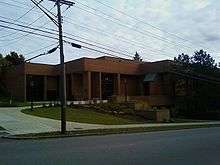
- The Pelletier Library (in 2008) had 922,540 volumes (491,284 microform titles).[2] Another estimate was that the library had 420,000 bound volumes, 227,000 microform titles, 1,000 periodicals, and 261,000 U.S. government and Pennsylvania state documents.[5] The library has noteworthy Americana and Ida Tarbell collections.[5] A computer lab, audiovisual center, and music listening system are there too.[5] It is named after past president Lawrence L. Pelletier who served from 1955 to 1980.[33] The Learning Commons, which is located in Pelletier Library, assists students with writing, research, public speaking and study skills, and also offers disability services.
- Newton Observatory houses a nine-inch refracting telescope and a computer-interfaced 10-inch Meade LX200 telescope with CCD camera.[34]
- The Allegheny College Center for Experiential Learning or ACCEL coordinates career internships, off-campus study programs, service-learning, pre-professional advising, and leadership development.[2]
- A Counseling Center offers guidance for students in adjusting to student life.[2]
- Winslow Health Center is staffed by a registered nurse and offers routine diagnosis and treatment; "when necessary, students are referred to specialists in Meadville" – it's located in Schultz Hall.[2]
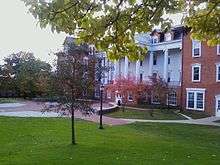
- The main dining facility is in Brooks Hall, and students can also dine at McKinley's Food Court in the campus center. There have been efforts by students to support the relationship between food services and local farmers.[35] Allegheny won a $79,545 grant in May 2009 to buy equipment to help with composting food waste, including a shredder mill, screening plant, conveyor, skid-steer loader and leaf collection system.[36]
- A newly built Vukovich Center for Communication Arts featuring a garden roof for energy efficiency and beauty was completed in 2008 at a cost of $23 million.[37][38] Robert Vukovich (1965) and Laura Vukovich made a substantial donation of $22 million in February 2001, part of which was used to construct the building.[38][39] Allegheny has its own cable TV channels and a state-of-the-art television studio.[5]
- The Center for Political Participation was founded at Allegheny in 2002 by political science professor Daniel M. Shea, following concerns about low youth voter turnout in the 2000 presidential election.[40] The CPP conducts scholarly research related to youth political participation; sponsors on-campus events related to politics and the electoral process, such as panel discussions; and conducts community-outreach efforts, including the Model Campaign USA program, a campaign simulation designed to get high school students interested in electoral politics.
- Henderson Campus Center was recently renovated and includes McKinley's food court, the bookstore, the game room, Grounds for Change—the student-run coffee house, the post office, and campus offices of College departments as well as student organizations.[41] Also included in the Henderson Campus Center are the Bowman, Penelac & Megahan Art Galleries.[5] Allegheny has auctioned art at times to raise money to renovate other projects, such as the college's Doane School of Art.[42]
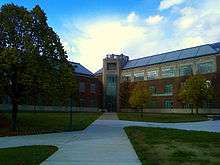
- Sports facilities include the $13 million David V. Wise Sport & Fitness Center, which opened in 1997.[5]
- A Women's Center was established in 2003 to be a resource for research on gender issues and women's history.[43]
- The college established the Center for Economic and Environmental Development in 1997.[44]
Prospective students
Admissions
There were 4,324 applications for admission to the class of 2019 (enrolling fall 2015): 2,955 were admitted (68.3%) and 492 enrolled (an admissions yield of 16.6%).[45] The average high school GPA of enrolled freshmen was 3.69, and 47% had a high school GPA of 3.75 or higher.[45] The middle 50% range of enrolled freshmen on SAT scores was 503–630 for reading, 510-620 for math, and 480-618 for writing, while the ACT Composite middle 50% range was 22–29.[45]
Rankings
| University rankings | |
|---|---|
| National | |
| Forbes[46] | 242 |
| Global | |
| Liberal arts colleges | |
| U.S. News & World Report[47] | 72 |
| Washington Monthly[48] | 23 |
U.S. News & World Report ranked it tied for 72nd among liberal arts colleges, and 6th "most innovative school" in the United States for 2016,[49]
Washington Monthly, which rates schools based on the degree to which they "contribute to the public good" by improving social mobility, producing research and promoting service, ranked Allegheny 23rd among liberal arts colleges in 2015.[50]
In 2012, The Daily Beast ranked Allegheny as the nation's 20th most academically-rigorous school.[51]
The Princeton Review ranked Allegheny among the top 353 green colleges in the United States and Canada in its 2015 Guide to Green Colleges.[52] Similarly, the Sierra Club rated Allegheny as 66th among "America's Coolest Schools," [53] recognizing it for its green initiatives.
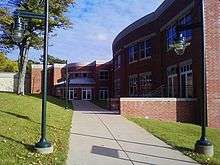
Costs and financial aid
Tuition and fees for the 2013–2014 year total $37,610; room and board is $9,540.[32] In 2011–2012, 86 percent of applicants for financial aid received aid; the average financial aid award was $31,716.[54] US News reported that as of 2012–13, 70.8 percent of all full-time Allegheny undergraduates receive some form of need-based financial aid, and the average award is $22,848.[55]
Parents of incoming first-year students are advised by the college to complete the Free Application for Federal Student Aid or FAFSA; Allegheny's school code is 003230.[56] Different scholarships are available as well as loan options.[56] It is possible for parents to pay in ten equal installments.[57]
Allegheny uses inducements such as scholarships and discounts to attract students.[58] Many "merit aid" discounts are offered regardless of ability to pay.[58] Extensive merit aid is available up to $80,000 for four years of study.[32]
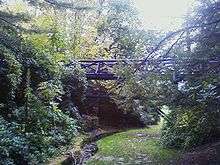
A report in 2006 suggested that 78% of Allegheny graduates would carry debt averaging at $24,825.[59]
Academics
Programs
Humanities include Art, Communication Arts, Dance and Movement Studies, English, Modern and Classical Languages (includes Chinese, French, German, Latin, and Spanish), Music, Philosophy and Religious Studies.[60]
Natural Sciences include Biochemistry, Biology, Chemistry, Computer Science, Environmental Science, Geology, Mathematics, Neuroscience, Physics.[60]
Social Sciences include Economics, Environmental Studies, History, International Studies, Political Science, Psychology.[60]
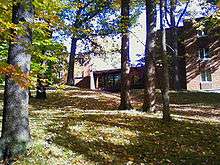
Minor courses of study are offered in the above disciplines, and also include: American Studies, Arts and the Environment, Asian Studies, Black Studies, Classical Studies, Chinese Language, Chinese Studies, Dance and Movement Studies, French Studies, German Studies, Lesbian and Gay Studies, Latin American and Caribbean Studies, Media Studies, Medieval and Renaissance Studies, Science, Health and Society, Russia and Eastern Europe, and Values, Ethics and Social Action. Allegheny also offers opportunities for students to design their own majors and minors. Students may also choose to double-major or double-minor if they have sufficient credits.
Allegheny is accredited by the Middle States Commission on Higher Education (MSCHE).[8]
About 30% of the school's 2,100 students graduate in one of the "STEM" disciplines—science, technology, engineering, and math.[61] Allegheny does not have any Reserve Officer Training Programs or ROTC, for Air Force, Army or Navy.[62] The student to faculty ratio was 13 to 1.
There were approximately 162 active faculty members (not counting adjunct faculty or faculty emeriti) in 2008.[2]
Calendar year
Allegheny's academic calendar is divided into two 15-week semesters. The school year typically runs from the last week of August to mid-May, with a short fall break in mid-October, a Wednesday-to-Sunday Thanksgiving break, a month-long winter break from mid-December to mid-January, and a week-long spring break in the third week of March.[63]
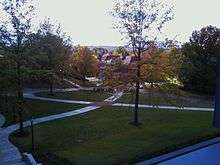
Requirements for degrees
Allegheny requires students to choose a minor as well as a major[64] and encourages "unusual combinations" of majors and minors.[64] A student's major can be in the humanities, social sciences or natural sciences, but that student's minor must be in a different division than his or her major.[61][64] A reporter explained: "a student enrolled in a humanities major such as English, art, or religious studies, would still take 20 to 24 credits – five to six courses – of science-related study if they decided to pick their minor within the natural sciences division ... Even if they don't, they still are required to pick two courses from within the natural science areas. One of those science courses must be a lab class."[61] The interdisciplinary approach is reflected in how graduates have fared with their careers. For example, Kathleen Harrill earned degrees in music and psychology at Allegheny, and used them to become a music therapist to help autistic children; her 300-page thesis on music and healing won recognition.[65] Another graduate studied both English and bioethics at Allegheny, and became a lawyer at Bayer corporation helping to work on ethics and compliance issues.[66] One student who wanted to become a special education teacher found a new love of documentary filmmaking after majoring in communication arts; her senior film "Finding Matty's Voice" won the Best Documentary and Grand Jury prizes at the Ivy Film Festival at Brown University in 2008.[67] There is some debate at Allegheny about requiring scientific-related coursework and whether there should be an emphasis on "scientific literacy".[61]
Allegheny students must complete a minimum of 36 semester credit hours of coursework in their major with an average grade of 2.0.[68] Satisfactory completion of a minor requires completion of 20 credits of coursework with a minimum grade average of 2.0.[68] In addition, students must take at least two courses (8 semester credit hours) in a discipline other than their major or minor.[68] Total credits for graduation are 128 semester credit hours, and no more than 64 credit hours can be from any one department.[68] Almost all courses carry four semester hours of credit.[60]
All students are required to take a three-seminar series which "encourages careful listening and reading, thoughtful speaking and writing, and reflective academic planning and self-exploration," to be completed in their first two years.[69] Sophomores typically meet with faculty advisers eight times a year.[70]
Allegheny seniors are required to complete a senior project in their major.[68] Some senior projects can be quite ambitious; in 2007, one senior project involved comprehensive instructions for installing solar panels on the roof of a campus building.[71]
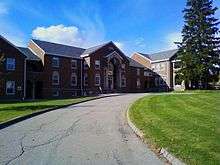
Study abroad
Allegheny offers direct enrollment programs at Lancaster University, England; James Cook University, Australia; University of Natal, South Africa; Capital Normal University, China; and Karls-Eberhard University, Germany.[5] It offers language and area studies programs in Seville, Spain; Angers, France; Karls-Eberhard University, Germany; and Querétaro, Mexico.[5] It offers internship programs in London, England; Paris, France; and Washington D.C.[5] Programs geared to specific majors are also available, including environmental studies at the Arava Institute for Environmental Studies, Israel; and the Center for Sustainable Development, Costa Rica; marine biology at the Duke University Marine Lab in North Carolina; and political science at American University.[5] Allegheny faculty members have led domestic summer-study tours to New York, Yellowstone, Austria, Costa Rica, and South Africa.[5] Individually arranged study abroad has taken students to Argentina, Canada (Nova Scotia), China, Cuba, Greece, Italy, Mexico, and Scotland.[5]
Cooperative and reciprocal programs
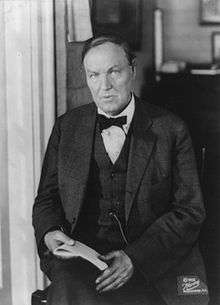
Allegheny has medical school cooperative programs available with three institutions: Philadelphia College of Osteopathic Medicine, Drexel University[72] and Jefferson Medical College. Allegheny offers pre-professional programs in law and health.[2] It has an arrangement with Drexel University College of Medicine to admit two Allegheny students who meet specific criteria (grades, MCAT scores).[2] It has an arrangement with the William E. Simon School of Business Administration at the University of Rochester to have preferred admission to selected students by the end of their junior year.[2][70] Allegheny offers cooperative 3–2 liberal arts/professional programs in engineering with Case Western Reserve University, Columbia University, the University of Pittsburgh, and Washington University.[5] There is also a 3–2 Master of Information Systems Management (MISM) program reciprocal agreement with Carnegie Mellon University.
Faculty
Four faculty won Fulbright awards in March 2001.[73] Faculty sometimes focus on the local area; for example, economics professor Stephen Onyeiwu conducted a study of manufacturing in the northwestern Pennsylvania region.[74] Ninety percent of faculty have terminal degrees in their respective fields.[5] Books by faculty include Congressional Women and Comedy from Shakespeare to Sheridan.[5] A literary prize was won by Allegheny writing instructor Kirk Nesset for his collection "Paradise Road" in 2007.[75] Faculty actively publish on a wide range of subjects from the biology of woodpeckers,[76] to structural features of ribosomal RNA,[77] to freshwater invertebrates.[78]
Student life
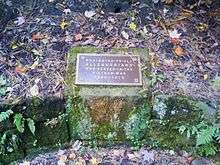
Students
Students generally are required to live on campus for all four years, and may reside in traditional dormitories, apartment-style housing, or college-owned houses.[32]
The demographics of students as of fall 2015 were: White (non-Hispanic) 75.9%,; Hispanic/Latino 7.0%, Black (non-Hispanic) 5.9%; Two or more races 4.7%, Non-resident alien 2.8%, Asian & Pacific Islander 2.4%; American Indian or Alaskan native 0.1%; Unknown 1.2% .[3]
Allegheny students in 2008 come from 33 states and 25 other countries.[5] Allegheny had a "diversity index" of .15 on a scale of .99=extremely diverse to .01=not diverse.[79]
Students participate in volunteer activities: in the fall semester of 2011, the student body contributed 25,000 hours of volunteer service to the community.[80] Some Allegheny students volunteered to help restore businesses in hurricane-ravished New Orleans.[81] Residence halls and classrooms are closed during summers.[2] An Allegheny Student Government has an active role in formulating college policy, curriculum choices, personal conduct, promoting cultural programs, and making decisions about the school's calendar.[5]
Information about students is generally kept private in keeping with the 1974 "Family Educational Rights and Privacy Act" which prohibits colleges from releasing information about their students without student permission.[82] Accordingly, parents can not learn about their son's or daughter's grades unless a waiver is signed permitting release of such information. The privacy policy can sometimes lead to problems, particularly when students have mental health problems but the school is prevented legally from contacting parents. In 2002, one Allegheny student committed suicide, and his parents sued the school; a jury in 2006 found that the school was not liable or negligent.[82] This case helped focus national attention on the competing issues of student privacy and parental rights.[83]
Campus security includes 24-hour foot and vehicle patrols, late night escort service, lighted pathways and sidewalks, controlled residence hall access, and 24-hour emergency telephones.[62] Health service is offered.[62] Despite proximity to the snowbelt, snow rarely shuts down the town of Meadville or the college.[84]
Official college policy is to discourage underage (less than 21 years) drinking, although there have been incidents of violations at off-campus parties.[85] Incoming students are required to take an online course about the dangers of alcohol abuse.[85] The school punishes transgressions with disciplinary action.[85]
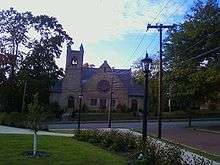
Media
Students run a campus radio station WARC 90.3 FM and a publication called "The Allegheny Review" of undergraduate literature.[86] The college hosts outside speakers.[87] Allegheny has numerous student groups and organizations such as an astronomy club, a College Choir, an Outing Club, and a Peace Coalition.[88] There are over 100 clubs and organizations offered at Allegheny.[5] The Allegheny newspaper is called The Campus. It is distributed weekly at locations all over the college. It covers campus news, features, opinion and a wrap-up of the college sports. The Campus is entirely student-run, with an editorial board of students in charge of making all executive decisions for the publication. The Allegheny alternative magazine is called Overkill. It is tri-semester student publication distributed in unconventional locations around campus, such as in vending machines, fireplaces, and chandeliers. It features student editorials, poetry, non-fiction and fiction pieces, art, and photography with a highly distinctive design and attitude.
Allegheny has welcomed a variety of entertainers and guest speakers over the last several years including John Updike, Dave Matthews, Dick Cheney,[89] Bill Clinton,[90] W.D. Snodgrass, Adam Sandler, George Carlin, The Vienna Choir Boys, Rusted Root, Ben Folds, The Roots, Stephen Lynch, The Fray, Jimmy Fallon,[91] and comedian Wayne Brady.[92] There have been "live" art shows in which invited artists, over an eight-hour period, created 10-by-10-foot "drawings" on gallery walls while spectators watched.[93]
Athletics
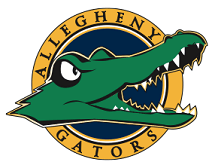
| Sports |
|---|
| Men's |
|
NCAA Division III Cross-Country Running, Football, Basketball, Swimming And Diving, Track And Field, Baseball, Golf, Soccer, Tennis |
|
Intercollegiate Club Teams Cheerleading, Crew, Equestrian Sports, Fencing, Table Tennis, Ice Hockey, Skiing (Downhill), Ultimate Frisbee, Rugby, Lacrosse, Volleyball |
| Intramurals |
| Women's |
|
NCAA Division III Cross-Country Running, Basketball, Swimming And Diving, Track And Field, Softball, Golf, Lacrosse, Soccer, Tennis, Volleyball |
|
Intercollegiate Club Teams Cheerleading, Crew, Equestrian Sports, Fencing, Table Tennis, Skiing (Downhill), Ultimate Frisbee, Rugby |
|
Intramural Sports Bowling, Football, Racquetball, Basketball, Softball, Golf, Soccer, Tennis, Volleyball |
Allegheny, known athletically as the Gators, belongs to the North Coast Athletic Conference and has NCAA Division III teams.[94] Men's sports are baseball,[95] basketball,[96][97] cross country, football,[98] golf, soccer,[99] swimming and diving, tennis,[100] and track & field.[94][101][102] Women's sports are basketball,[96][97] cross country, golf, lacrosse, soccer,[99] softball, swimming & diving, tennis,[100] track & field,[102] and volleyball.[94] Sports facilities include the Wise Center and the Robertson Complex.[103] 75 percent of students play intramural sports.[5] The 1990 Allegheny football team, led by first-year head coach (and current Iowa assistant) Ken O'Keefe, won the Division III football national championship 21–14 over Lycoming College.
Traditions
One tradition is that a female student is not a "real co-ed" until she's been kissed on the thirteenth plank of the Rustic bridge over the stream.[104][105] Legend states that there is a competition among residence halls during Orientation Week to steal the thirteenth plank and display it, though this rarely happens today;[106] random students take the plank instead, with maintenance keeping a supply of replacement planks on hand.[104]
Fraternities and sororities
Allegheny College also has a number of fraternities and sororities on campus. These include Kappa Kappa Gamma, Kappa Alpha Theta, Delta Delta Delta, Alpha Delta Pi, and Alpha Chi Omega for the sororities. In 2009, 34% of Allegheny women belonged to a sorority.[107] The fraternities on campus include Theta Chi, Phi Kappa Psi, Delta Tau Delta, and Phi Delta Theta. In the Fall of 2012, the Pi Chapter of Phi Gamma Delta was reestablished at Allegheny College.
Administration
Location and transportation

Allegheny is located in northwestern Pennsylvania 90 miles (140 km) north of Pittsburgh, 90 miles (140 km) east of Cleveland, and 35 miles (56 km) south of Erie, in the town of Meadville, Pennsylvania.[5] The school's main address is 520 North Main Street, Meadville, PA 16335.[5] The phone number is (814) 332–3100.[5] Allegheny is located near Interstate 79; in addition, there is bus service to nearby cities such as Cleveland, Erie, and Pittsburgh.[5]
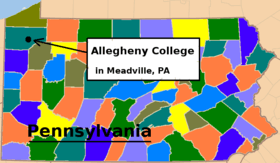
Finances
In fiscal year 2007, Allegheny had revenues from tuition and fees of $33,149,074, government grants and contracts of $1,091,068, private gifts grants and contracts of $8,925,845 and an investment return of $31,748,504, and other core revenues of $1,040,120.[108] Expenses included instruction $19,442,708, research $966,394, academic support $6,040,548, student service $2,029,686, and institution support $9,766,374.[108]
Administration and staff
There are approximately 150 administration and staff personnel in 2008.[2] The president since August 2008 is James H. Mullen Jr.[2] The staff breakdown is as follows: 157 full-time employees doing instruction, research, and public service; 43 executive, administrative, and managerial personnel; 103 other professionals (support/service); 9 technical and paraprofessionals; 68 clerical and secretarial employees; 12 skilled craftspersons; and 27 service & maintenance staff.[108] In addition, part-time staff included 36 instructors, 23 other professionals, 10 secretaries, and 4 service and maintenance staff.[108] Of the 157 full-time faculty, 87 have tenure, and 41 are on a tenure track.[108] The average salaries of professors (in 2007) was $83K, associate professors was $63K, assistant professors was $51K, instructors was $38K.[108] Allegheny is a member of the Higher Education Data Sharing Consortium, or HEDS, in which member institutions share information relating to improvement of higher education.[109]
Notable people
References
- ↑ As of June 30, 2015. "U.S. and Canadian Institutions Listed by Fiscal Year (FY) 2015 Endowment Market Value and Change in Endowment Market Value from FY 2014 to FY 2015" (PDF). National Association of College and University Business Officers and Commonfund Institute. 2016.
- 1 2 3 4 5 6 7 8 9 10 11 12 "2008–2009 catalogue see various pages". Allegheny College. August 26, 2009.
- 1 2 "Common Data Set 2015–2016, Part B". Allegheny College Institutional Research.
- ↑ "PHMC Historical Markers Search" (Searchable database). Pennsylvania Historical and Museum Commission. Commonwealth of Pennsylvania. Retrieved 2014-01-25.
- 1 2 3 4 5 6 7 8 9 10 11 12 13 14 15 16 17 18 19 20 21 22 23 24 "Allegheny College". FastWeb. August 28, 2009. Retrieved August 28, 2009.
- ↑ "Allegheny College". Retrieved May 19, 2013.
- 1 2 Stewart, Anne W. (February 7, 2003). "Nothing New Under the Sun". The Wall Street Journal. Retrieved August 26, 2009.
- 1 2 "Allegheny College". 4International Colleges & Universities. August 28, 2009. Retrieved August 28, 2009.
- ↑ Haskins, Charles H.; Hull, William I. (1902). A History of Education in Pennsylvania. Washington Government Printing Office. p. 10.
- ↑ "National Historic Landmarks & National Register of Historic Places in Pennsylvania" (Searchable database). CRGIS: Cultural Resources Geographic Information System. Note: This includes John P. Davis (December 1977). "National Register of Historic Places Inventory Nomination Form: Ruter Hall" (PDF). Retrieved June 23, 2013.
- 1 2 "Hulings Hall". Council of Independent Colleges. August 28, 2009. Retrieved August 28, 2009.
- ↑ Arnesen, Eric (April 5, 2008). "The muckraker and the magnate – Examining the lives of investigative journalist Ida Tarbell and oil baron John D. Rockefeller". Chicago Tribune. Retrieved August 28, 2009.
- ↑ "Been Down So Long It Looks Like Up to Me". The Internet Movie Database. 1971. Retrieved August 28, 2009.
- ↑ Budofsky, Laura (Nov 4, 1971). "C.U. Too Freaky for 50's Flick". Cornell Daily Sun. p. 1 Vol 87 No. 46.
- 1 2 Bill Schackner (October 4, 2006). "Allegheny College opposes Penn State's renaming McKeesport campus". Pittsburgh Post-Gazette. Retrieved August 25, 2009.
- ↑ Ann Belser (October 12, 2006). "Penn State Ice Cream frozen out". Pittsburgh Post-Gazette. Retrieved August 25, 2009.
- ↑ "Fighting for a name: Allegheny College sues AHERF over health school moniker". Modern Healthcare. March 3, 1997. Retrieved August 28, 2009.
- ↑ Sostek, Anya (December 4, 2008). "Economy not hurting local college enrollment". Pittsburgh Post-Gazette. Retrieved August 25, 2009.
- ↑ "Elms College president named to lead Allegheny College". Boston Globe (boston.com). Associated Press. February 20, 2008. Retrieved August 28, 2009.
- ↑ "Allegheny College surpasses goal". Pittsburgh Business Times. July 20, 2006. Retrieved August 28, 2009.
- ↑ Eleanor Chute (February 21, 2008). "Allegheny College names new president". Pittsburgh Post-Gazette. Retrieved August 25, 2009.
- ↑ Hahn, Tim (June 6, 2007). "'Big, big asset' Study details college's benefit to economy". Crawford County News. Retrieved August 26, 2009.
- ↑ "Allegheny College Revives Festival". Pittsburgh Post-Gazette. April 21, 2002. Retrieved August 28, 2009.
- ↑ "Dozens face party-related charges". The Meadville Tribune. October 2, 2006. Retrieved February 9, 2009.
- 1 2 Steve Levin (July 10, 2007). "Meadville mishap defines wrecking ball One breaks loose, goes on tear near college". Pittsburgh Post-Gazette. Retrieved August 25, 2009.
- ↑ Alison Go (July 11, 2007). "Wreck and Roll". US News & World Report. Retrieved August 26, 2009.
- ↑ "Wrecking ball rampage in Meadville injures three". Pittsburgh Post-Gazette. July 9, 2007. Retrieved August 25, 2009.
- ↑ "Allegheny College to host panel on face transplants". Pittsburgh Post-Gazette via USA Today. May 20, 2009. Retrieved August 26, 2009.
- ↑ "Allegheny College Professor Michael Maniates Appointed to Story of Stuff Project ...". Reuters. May 11, 2009. Retrieved August 26, 2009.
- ↑ Reed Johnson (May 10, 2009). "Shoppers cut back on spending, for now". The Los Angeles Times. Retrieved August 28, 2009.
- ↑ "Siemens Helps Allegheny College Launch Energy Reduction Program". Reuters. Jun 17, 2008. Retrieved August 26, 2009.
- 1 2 3 4 "About Allegheny: Facts". Allegheny College. Retrieved May 20, 2013.
- ↑ Lamont Jones (August 12, 1995). "Lawrence L. Pelletier – Allegheny College chief in 1955–80". Pittsburgh Post-Gazette. Retrieved September 2, 2009.
- ↑ "Physics: Facilities and Strengths". Allegheny College. Retrieved May 20, 2013.
- ↑ Jennie geisler (May 5, 2008). "Advocates of eating locally say it helps save the planet – Here's where to find local products in our region". Crawford County News. Retrieved August 26, 2009.
- ↑ "Compost Infrastructure Grants Announced". Reuters. May 20, 2009. Retrieved August 26, 2009.
- ↑ John bartlett (August 31, 2006). "Allegheny sets groundbreaking for $23M facility". Erie Times-News. Retrieved August 26, 2009.
- 1 2 "The Cook Years: A Timeline of Accomplishments and Events". Allegheny Magazine. February 2001. Retrieved August 28, 2009.
- ↑ "Allegheny College gets $22.2 million gift". Pittsburgh Post-Gazette. Feb 16, 2001. Retrieved August 28, 2009.
- ↑ Shea, Daniel M. (2012). "From the Director" (PDF). The Soapbox: 1. Retrieved May 21, 2013.
- ↑ "Campus Center". Allegheny College. August 26, 2009. Retrieved August 26, 2009.
- ↑ John Bartlett (March 29, 2005). "Allegheny College art auction nets $215,000". Erie Times-News. Retrieved August 28, 2009.
- ↑ "Allegheny College to unveil Women's Center". Erie Times-News. March 25, 2003. Retrieved August 28, 2009.
- ↑ "Allegheny College Establishes Center for Economic And Environmental Development". PR Newswire. July 23, 1997. Retrieved August 28, 2009.
- 1 2 3 "Common Data Set 2015–2016, Part C". Allegheny College Institutional Research.
- ↑ "America's Top Colleges". Forbes. Retrieved August 15, 2015.
- ↑ "Liberal Arts Colleges Rankings". America's Best Colleges 2016. U.S. News & World Report. Retrieved January 31, 2016.
- ↑ "Washington Monthly's 2015 Liberal Arts College Rankings". Washington Monthly. August 24, 2015.
- ↑ "U.S. News Best Colleges Rankings". U.S. News & World Report. September 9, 2015.
- ↑ "College Guide: 2015 Liberal Arts College Rankings". Washington Monthly.
- ↑ "College Rankings 2012: Most Rigorous Schools". The Daily Beast. August 6, 2012. Retrieved May 18, 2013.
- ↑ "The Princeton Review's Guide to 353 Green Colleges". The Princeton Review. 2015. Retrieved September 9, 2015.
- ↑ "America's Greenest Universities". The Sierra Club. 2015. Retrieved September 9, 2015.
- ↑ "Allegheny College: Money Matters". CollegeData. Retrieved May 25, 2013.
- ↑ "Allegheny College Paying for School". US News. Retrieved May 25, 2013.
- 1 2 "Allegheny College (website)". Allegheny College (website). August 26, 2009. Retrieved August 26, 2009.
- ↑ "Allegheny College (website)". Allegheny College (website). August 26, 2009. Retrieved August 26, 2009.
- 1 2 Eleanor Chute (October 22, 2006). "Colleges caught in tuition alms race Awards to students who are well off cuts aid to needy". Pittsburgh Post-Gazette. Retrieved August 25, 2009.
- ↑ Bill Schackner (August 18, 2006). "Carnegie Mellon, Pitt climb in rankings". Pittsburgh Post-Gazette. Retrieved August 25, 2009.
- 1 2 3 4 "Allegheny College". Allegheny College. August 26, 2009. Retrieved August 26, 2009.
- 1 2 3 4 Bill Schackner (February 10, 2009). "Colleges debate which STEM courses for all – How many credits should be required for students not bound for science careers?". Pittsburgh Post-Gazette. Retrieved August 25, 2009.
- 1 2 3 "Best Colleges – Allegheny College". US News & World Report. August 26, 2009. Retrieved August 26, 2009.
- ↑ "The Academic Program". Allegheny College.
- 1 2 3 "Allegheny College (website)". Allegheny College (website). August 26, 2009. Retrieved August 26, 2009.
- ↑ Mark Roth (December 29, 2008). "The Thinkers: Therapist is music to their ears". Pittsburgh Post-Gazette. Retrieved August 25, 2009.
- ↑ Joyce Gannon (July 12, 2009). "Bayer official pushes appropriate, ethical business behavior". Pittsburgh Post-Gazette. Retrieved August 25, 2009.
- ↑ Tina Calabro (May 8, 2008). "Autistic teen inspires undergrad to produce award-winning film". Pittsburgh Post-Gazette. Retrieved August 25, 2009.
- 1 2 3 4 5 "Allegheny College (website)". Allegheny College (website). August 26, 2009. Retrieved August 26, 2009.
- ↑ "Graduation Requirements". Allegheny College.
- 1 2 "Allegheny College". collegebound network. August 28, 2009. Retrieved August 28, 2009.
- ↑ Maggie Surface (April 2007). "Solar at Allegheny: Model for the Future". Department of Environmental Science and Department of Physics. Retrieved September 2, 2009.
- ↑ "Accelerated, Early Assurance and Post Baccalaureate Linkage Programs". Drexel University College of Medicine. July 18, 2012. Archived from the original on January 18, 2010. Retrieved August 28, 2009.
- ↑ "The Cook Years: A Timeline of Accomplishments and Events". Allegheny Magazine. March 2001. Retrieved August 28, 2009.
- ↑ Jim martin (August 19, 2009). "Region's industrial economy works to recover". Erie Times-News via USA Today. Retrieved August 28, 2009.
- ↑ "Allegheny College professor wins Drue Heinz prize". Pittsburgh Post-Gazette. February 13, 2007. Retrieved August 28, 2009.
- ↑ Walter D. Koenig, Ronald L. Mumme, Mark T. Stanback, and Frank A. Pitelka (December 7, 1994). "Patterns and consequences of egg destruction among joint-nesting acorn woodpeckers". Animal Behaviour Volume 50, Issue 3, 1995 Pages 607–621. Retrieved September 2, 2009.
- ↑ Matthew A. Fountain Martin J. Serra Thomas R. Krugh Douglas H. Turner (May 28, 1996). "Structural Features of a Six-Nucleotide RNA Hairpin Loop Found in Ribosomal RNA". Biochemistry 1996, 35 (21), pp 6539–6548. Retrieved September 2, 2009.
- ↑ Donald P. Batzer, Russell B. Rader, Scott A. Wissinger (1999). "Invertebrates in Freshwater Wetlands of North America: Ecology and Management". John Wiley & Sons Inc. Retrieved September 2, 2009.
- ↑ "Best Colleges: Racial Diversity: Liberal Arts Colleges". US News & World Report. 2008–2009. Retrieved August 28, 2009.
- ↑ Linda A. Dickerson (December 16, 2001). "Business News – Allegheny College works to involve students in electoral politics". Pittsburgh Post-Gazette. Retrieved August 25, 2009.
- ↑ "Two years later, New Orleans coffeehouse is back in business". Associated Press via Chicago Tribune archives. Associated Press. August 27, 2007. Retrieved August 26, 2009.
- 1 2 Cleary, Caitlin; Majors, Dan (August 20, 2006). "Suit says Allegheny College remiss in student's suicide". Pittsburgh Post-Gazette. Retrieved August 25, 2009.
- ↑ Elizabeth Bernstein (December 28, 2007). "Bucking Privacy Concerns, Cornell Acts as Watchdog Staff Trained to Spot Students in Distress; Campus Suicides Drop". The Wall Street Journal. Retrieved August 26, 2009.
- ↑ Megan McNally (March 3, 2009). "Reflecting on the snow in D.C.". Allegheny College Study Abroad Spring 2009. Retrieved August 28, 2009.
- 1 2 3 "Allegheny College statement". Erie Times-News. October 3, 2006. Retrieved August 28, 2009.
- ↑ "The Allegheny Review". Forbes. 2003. Retrieved August 26, 2009.
- ↑ Martin, Jim (November 21, 2008). "Columnist sees eating contest as chance for liberals". Erie Times-News. Retrieved August 26, 2009.
- ↑ "Student Groups & Organizations at Allegheny College". Allegheny College. August 26, 2009. Retrieved August 26, 2009.
- ↑ Jamie Musick (February 11, 2007). "Allegheny rethinks political participation policy". The Meadville Tribune. Retrieved August 28, 2009.
- ↑ Jane Smith (April 19, 2008). "Bill Clinton visits Allegheny College". The Meadville Tribune. Retrieved August 28, 2009.
- ↑ "Live from Meadville ... It's Jimmy Fallon! Saturday Night Live Comedian to Perform at Allegheny College". Allegheny College. Aug 14, 2002. Retrieved August 28, 2009.
- ↑ "Comedian Wayne Brady to Appear Live at Allegheny". Allegheny College. Feb 12, 2007. Retrieved August 28, 2009.
- ↑ "Allegheny College to Host Wall-to-Wall, 8-Hour Art Event". Pittsburgh Post-Gazette. February 14, 2002. Retrieved August 28, 2009.
- 1 2 3 "Allegheny College (website)". Allegheny College. August 26, 2009. Retrieved August 26, 2009.
- ↑ Nicholas Tolomeo (July 9, 2009). "PG South: After busy junior year, Abbott takes time off". Pittsburgh Post-Gazette. Retrieved August 25, 2009.
- 1 2 "PG North: Campus notebook". Pittsburgh Post-Gazette. December 21, 2006. Retrieved August 25, 2009.
- 1 2 "College basketball roundup: Temple surges to rout Dukes, 72–43". Pittsburgh Post-Gazette. Associated Press. February 24, 2007. Retrieved August 25, 2009.
- ↑ Rich Emert (September 2, 2003). "Sports – Where are they now? Jeff Filkovski". Pittsburgh Post-Gazette. Retrieved August 25, 2009.
- 1 2 "PG South: Peters grad earns NCAC honor". Pittsburgh Post-Gazette. November 1, 2007. Retrieved August 25, 2009.
- 1 2 "Seneca grad nets success". Pittsburgh Post-Gazette. November 1, 2007. Retrieved August 25, 2009.
- ↑ Rich Emert (March 29, 2007). "EAST: Hempfield thrower chooses track & field over football for college sport". Pittsburgh Post-Gazette. Retrieved August 25, 2009.
- 1 2 "PG North: Campus notebook". Pittsburgh Post-Gazette. November 16, 2006. Retrieved August 25, 2009.
- ↑ "Allegheny Gators". Allegheny College. August 26, 2009. Retrieved August 26, 2009.
- 1 2 "Brooks Hall". wiki.worldflicks.org. August 28, 2009. Retrieved August 28, 2009.
- ↑ Yale Daily News Staff (2007). "The Insider's Guide to the Colleges – 2007 edition page 827". Yale Daily News. Retrieved August 27, 2009.
- ↑ Kenney, Daniel; Ricardo Dumont; Ginger Kenney (2005). Mission and Place: Strengthening Learning and Community through Campus Design. The United States of America: Praeger Publishers. p. 75. ISBN 0-275-98123-1.
- ↑ Staff writers (August 26, 2009). "Best Colleges 2010". US News & World Report. Retrieved August 26, 2009.
- 1 2 3 4 5 6 "Institution Characteristics – Allegheny". U.S. Dept. of Education ies National Center for Education Statistics. August 26, 2009. Retrieved August 26, 2009.
- ↑ "Member Institutions". HEDS Consortium. 2009. Retrieved August 28, 2009.
External links
| ||||||
| ||||||
| ||||||||||
Coordinates: 41°38′59″N 80°08′42″W / 41.6498°N 80.1450°W